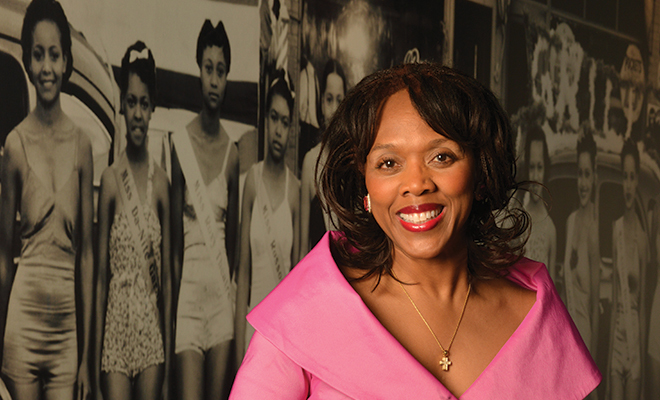 Lightbox Images
Lightbox Images
Tracy Winchester: Revitalizing a community that Captured her heart
Tracy Winchester is no stranger to hard work, effecting change and making a positive impact on the community in which she lives. Her stellar résumé reads like a page-turning and inspiring biography, brimming with impressive leadership roles, entrepreneurial endeavors, extensive legal experience and a cornucopia of honors and awards. However, upon first meeting her, you quickly realize that she is also a stranger to ego and arrogance and instead embraces a genuine, humble and welcoming down-to-earth presence that makes you feel right at home with her.
In her role as Executive Director of the Five Points Historic District, d/b/a Five Points Business District, which she assumed in 2011, this Boston College and Georgetown University Law Center graduate can barely contain her enthusiasm for all of the exciting developments that are re igniting this high-profile and historic neighborhood that boasts incredible stories of days gone by that would make even the movies jealous.
Despite the depth and substance of her position, Tracy remains surprisingly at ease in this job, as if it were expressly, or perhaps even divinely, created for her. Driven and ambitious since she was a young girl, Tracy has always been a goal setter. “When I was in college, I was a double major in political science and communications,” Tracy recalled. She earned her undergraduate degree from Boston College in 1977 at a time when cable television was rearing its head into the media mainstream. Tracy instinctively knew she wanted to be a part of the cable TV arena but she also had a strong penchant for politics and running for office. She understood that communication goes hand in hand with being politically involved. “I love being the voice of the voiceless,” she emphasized. “I love to advocate for those who cannot do so for themselves.”
As a child of the Civil Rights Movement, her native Southern parents taught Tracy the importance of articulating to the world the injustices you see. She was taught to speak her mind and enjoy the results in a positive and productive manner. “My dad supported my desire to represent people with my voice, but he also said I should have a solid background, go to law school, and advocate for civil rights,” she said. “It was through the communications aspect of my goals that I saw an opportunity to shape positive images. It is one thing to pass laws, but it is another thing to shape cultures.”
To that end, Tracy got her political feet wet by working for U.S. Senator Edward W. Brooke (RMA) as the assistant to the press secretary on media-related matters shortly after finishing her undergraduate work. She spent the next several years on Capitol Hill in Washington, D.C., earning her political stripes by working for Congressman Julian Dixon (D-CA), with the Congressional Black Caucus, and with the U.S. House of Representatives Finance Office while simultaneously earning her law degree. Subsequent to completing law school, Tracy worked as a law clerk for the NAACP Legal Defense Fund, clerked for a couple of esteemed law firms and ultimately became a research assistant at Georgetown University Law Center until the mid-1980s, when the opportunity to segue into the communications arena knocked on her door. She packed her bags and headed west to Denver, where she initially started as a Walter Kaitz Foundation fellow and then worked her way up to a position with Jones Intercable, Inc., in 1995 as director of product management.
After more than a decade at that company, Tracy became the regional director of Affiliate Sales and Relations for the ABC Family Channel, formerly the Fox Family Channel. By 1999, as then President and CEO of CoLours Television, the multicultural network, Tracy seized the opportunity to positively promote the African-American culture. This endeavor reached a subscriber level of 17 million satellite and cable TV households within the next ten years.
As with many companies in the second decade of the twenty-first century, the recession wreaked fiscal havoc on CoLours, forcing it to close its doors. In the process, another door opened for Tracy, one that allowed her to cross the threshold into the commercial redevelopment field. “I love to build things from the ground up, and when the opportunity to work with Five Points became available, I saw it as a great way to focus on the African-American culture and history and all the positive contributions they made in the West,” she smiled.
Nestled in a ten-block corridor along Welton Street on the northeast edge of downtown Denver, the Five Points Business District is realizing
a strong revitalization in recent months, thanks to its cool urban location, its rich cultural history and access to light rail. If ever there were the hot spot in town, this most definitely is it.
Tracy’s voice, peppered with obvious enthusiasm for her work and this project, beautifully articulated how this area at first caught her eye, but has now captured her heart. “What we are striving to preserve here is the rich culture, preserving the past while also bringing in new services and goods to support the surrounding neighborhoods,” she noted. She elaborated that they are focused on business development, cultural promotion and preservation, and the greater good, which translates not only to economic development but also to education, transportation, families and health.
From the 1920s through the 1960s, the Five Points Business District was a thriving center where people lived, worked and played. When
the United States banks redlined in the 1960s, mortgages were not readily accessible to the African-American community, which ultimately forced them to move out. Unfortunately, by the 1980s the area had greatly deteriorated. Gears began to shift in the 1990s, however, when people wanted to leave the suburbs and move back into the city. The idea to restore and revitalize such an integral part of Denver’s history began to realize a pulse that has since led to a strongly beating heart.
“When Denver finally became a four sport team (NFL, NBA, MBL and NHL), we went from a small town to the big leagues,” Tracy beamed. “The baseball stadium is actually in Five Points.” What has energized this area now are the Millenials, those in their early 20s to 30s, who are eschewing the suburban lifestyle in favor of living, working and playing in the city. “That is who we have attracted,” stated Tracy, who noted that the Five Points area is now 50 percent Caucasian, 25 percent African-American and 25 percent Latino. “The demographics have changed, but we still have this marvelous opportunity to keep the neighborhood and restore its glory days.”
According to Tracy, within the last year Five Points has realized $150 million in development projects and a multitude of projects are still on the horizon.
“We have a vision, a plan and a strategy to bring a community together,” said Tracy. “We want this to be a destination for arts, culture and entertainment, showcasing Denver’s strong African-American history and its rich jazz heritage. We also plan to strengthen existing businesses while bringing in new ones and working with everyone–residents, developers, the City, non-profits and stakeholders–to support this vision for the corridor.”
When not immersed in the passion for her work, Tracy relishes her personal time and is completely devoted to being a mom, which was actually her first goal in life, but that came later rather than sooner. “I got married at 46 and had a child, Austen, at 51,” stated Tracy, who turns 60 in June. “I just happened to reach my professional goals first.” Tracy also enjoys reading, skiing, practicing yoga and Pilates and staying active in her community by serving on multiple boards, including the Saint Francis Homeless Center, the Denver Urban Renewal Authority, the Denver Metro Chamber of Commerce and the Downtown Denver Partnership, Inc., among many others.
As she sets her gaze on the future, she sees herself involved with public service and giving back to the community in any capacity she can. “My parents taught me to work hard and always give back,” she reflected.
Sometimes, it seems the best sermons in life are clearly lived, not preached. HLM
For more information on Tracy and on the Five Points Business District, go online at fivepointsbiz.org.











